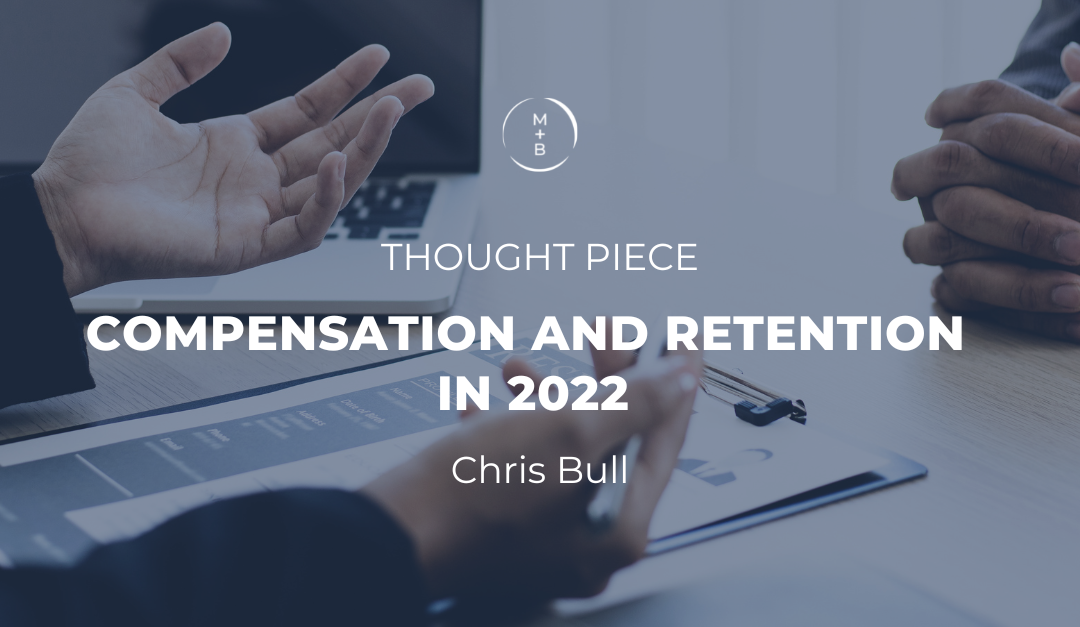As 2021 has been called the year of the “Great Resignation” or “Great Reshuffle”, 2022 will be the year of the “Great Reevaluation” and it is pressing senior leadership teams to re-imagine the role of compensation in the employee experience.
We can all agree that increased compensation levels for frontline workers and senior executives, and every role in between, is an enormous challenge in 2022. Whether you are looking to retain invaluable talent, or have the need to top-grade your existing team, the question of understanding cash compensation and benefits is what everyone is looking to get their arms around in today’s market. In a survey conducted by XpertHR, based on 351 responding organizations, 89% replied that “recruiting and hiring” is the biggest issue in 2022. Eight in ten organizations cited recruitment and retention as increasing pressures on total salary budgets for the coming year.

With the events over the last two years, it has been a guessing game for us all. The “Great Resignation/Reshuffle” has resulted in the busiest two years for our firm, throughout our 20 years in business. I have had many compensation discussions with executive leadership within privately owned, PE-backed, and public companies since the pandemic hit in 2020. I have learned that, from both our client companies and potential candidates, cash compensation and real or synthetic equity is the most important topic. More so than benefits, culture, work balance, and the like.
Serving as retained executive search professionals, M+B takes a consultative approach with each client. Moreover, we provide our clients with our own competitive compensation data reports, along with 3rd party compensation reports, to help our clients better understand the current national compensation climate which proves helpful in determining a fair and competitive financial package. However, there are many resources out there to help senior leadership teams determine the best compensation structure for their organizations.
“Pay Matters,” written during the pandemic by David Weaver, a 20-year compensation consultant, explains how to perform a detailed market analysis that reveals exactly how much each position in your organization should be paid, showing how to develop a pay philosophy specifically tailored to your organization and strike the elusive balance between profit and labor costs.
When asked how important compensation is overall, David states, “I believe it is the most important component from two different perspectives. From an employee’s perspective, it’s their livelihood. For the organization, payroll is the number one expense. These two things are at odds, needing to have a balance. You want to be paying people competitively, paying people what they’re worth. On the other hand, you can’t overpay everyone to keep them happy because you would go out of business. Senior management teams can’t go into this thinking they’re going to get the best person at the lowest price. It just doesn’t work that way.”

According to many polls, there is a high percentage of organizations who have outdated compensation plans or none at all. David has developed a near-perfect compensation system saying, “Compensation is just as much an art as it is a science.” His system is based on four pillars of policy decisions:




2021 caused employees to weigh the value of working for their current companies versus other pursuits. Employees who stayed throughout the layoffs, mandates, and shortages of 2020 expected better compensation packages in 2021. However, pay did not increase, and many resigned from their jobs. Most recently, when the economy heated back up, there were significantly more job openings than fills, and those who wanted to continue work have had their pick of opportunities. There is no incentive to stay if a new, better opportunity emerges. This situation creates a continual churn.
It seems the economic climate changes daily, and it is important to stay in tune with what economists predict as it relates to organizational strategy. For now, David states, “the bargaining power has shifted in the direction of the labor force, and it doesn’t look like it’s going to shift back anytime soon. In order to attract and retain talent in 2022, employers need to up their game.”

Chris Bull
Co-Founder + Managing Partner
bull@mbexec.com
Chris brings over 20 years of experience in retained executive search. He has a strong track record of success partnering with client organizations to deliver best-in-class talent with private and public companies, private equity firms, and their operating companies. As a trusted advisor to the clients in which they serve, McDermott + Bull has become one of the fastest-growing executive search firms in North America with offices located both domestically and internationally.
Citations
Appelbaum, D. + Weaver, D. (Hosts) (2020, November 11) Pay Matters: David Weaver https://authorhour.co/pay-matters-david-weaver/
Cision. (2021, December 27) Survey Finds Employers Are Preparing for an Epic Talent War in 2022. PR Newswire https://www.prnewswire.com/news-releases/survey-finds-employers-are-preparing-for-an-epic-talent-war-in-2022-301450080.html
Feffer, M. (2021, December 27) Employers Anticipate a Talent, Recruiting War in 2022. Recruiting Daily https://recruitingdaily.com/news/employers-anticipate-a-talent-recruiting-war-in-2022/
Pay Matters Website, David Weaver https://paymattersbook.com/

